By Carrie Crozier
Last month I tried to summarize “My Jakarta Life” into one concise article but there were just too many topics I wanted to mention! Drawing from the lessons I learned living in Jakarta, I embraced the chaos and we decided to split it into two parts. In part 1, I discussed the first steps and “must-do’s” of Jakarta living – Home, Healthcare, School, and Social Network. If you missed it, start with that article first.
With those important topics covered, this month in part 2, I focus on the cultural and daily life details of our life in Jakarta.
Trailing Spouse
My family moved to Jakarta for my husband’s job. For the first time in my life, I was a “trailing spouse”. For those not familiar with the term, it refers to the partner who isn’t employed by an Indonesian company and so their KITAS or visa is based on their partner’s work visa. It’s very common in Jakarta for only one partner to be working.
Working hours in Jakarta tend to be on the longer side and not many companies have embraced working remotely. This means the trailing spouse can spend a lot of time alone – at least at first. In fact, free time is one of the biggest differences when I compare my Jakarta life to my “normal” life elsewhere. This is a huge part of why I stressed the importance of building your social network early in part 1. Sometimes free time is wonderful and other times it can lead to feeling isolated, so jump into Jakarta life with both feet and try to experience as much as you can!
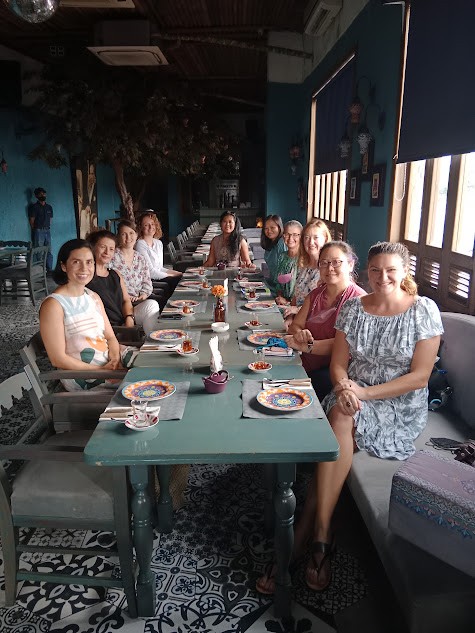
Household Staff
A big question that comes up as soon as you arrive – to nanny or not to nanny?
I can’t say, “YES, do it”, loudly enough! The quality of our daily life was vastly improved by having extra help at home. This was true both for me, a mother of young kids, but also for the kids too. They loved having the extra attention and an adult who will happily sit with them and play any games they like (example – hours of jumping through hoops in the pool, pictured below). It didn’t mean that I didn’t get to spend time with my kids – we often all played together. Having an extra adult on outings to the various playgrounds and play parks in Jakarta or on playdates – worth its weight in gold! Those parents reading this, I’m sure you can imagine a million scenarios where having a second caring and capable set of hands would be a huge asset.

But I can do it myself!
When we first hired our nanny and maid, I felt guilty – I wasn’t employed and housework had always been a fact of life, so why should it be any different here? Here are the reasons I learned to let that go:
1) Expat homes in Jakarta aren’t set-up to be easily managed by one person. As you can see from EMC’s many handover videos, the houses are usually massive, with sprawling marble floors, and several bathrooms. Due to the air quality in Jakarta, everything needs to be washed or dusted every couple of days, if not daily. There usually aren’t dishwashers or, as in our case, the dishwasher was tucked back into the staff area of the house, alongside the laundry facilities. Cleaning is a full-time job!
2) Errands take much longer to accomplish. Yes, you can use apps like Instacart and Tokopedia but for those who prefer to personally select the vegetables, or want to purchase gifts in person, or try on clothing, etc, there are times you still need to go to a physical store. With the lovely Jakarta traffic, this takes hours. Some tasks, you can send a staff member but if you need to go, the feeling of coming home to a clean house and a healthy, home-cooked meal is absolutely priceless!
These may sound like excuses to avoid cleaning – and sure, they kind of are – but there’s also another final, and very important, reason.
3) Hiring staff is supporting the local economy. We’re guests in this country and – to use the local slang for foreigners – congratulations, you are now a “bule”. Employing staff shows your local neighbours that bule or not, you want to be part of and support your community. You may not formally meet your local neighbours, aside from a wave and a smile when you pass by, but they, and your local RT, will know your security guards, maids, cooks, nannies, gardeners, pool guys, drivers, and anyone else you employ.
What about salary?
Salary was an important consideration for us – we wanted to pay fair wages but also not overpay because we were new and inexperienced. To start, I posted a question about local standard wages for different positions in expat WhatsApp and other social media groups, and discussed it with friends. Next, we considered the hours we wanted to be worked and the tasks we wanted covered. You’ll find salaries for nannies, for example, vary by levels of experience, proficiency with English, and whether they’re live-in or live-out. Experienced nannies will generally know what the market rates are and will usually have a salary expectation in mind.
Local Language
Language is another big cultural topic that comes up. The national language of Indonesia is Bahasa Indonesia, commonly referred to as “Bahasa”. Many Indonesians will speak the language of their region at home and with family, and Bahasa outside of their kampung (village), at school, or at work. On top of that, many who interact with foreigners will also learn English.
So do you NEED to learn Bahasa? No. But should you try to learn it? Yes! At minimum some basic words and phrases are very helpful. You’ll have an easier time in restaurants, grocery stores, and markets, and it also shows respect to the locals. Those who know me, know my Bahasa is very basic. But we did give it a go – my husband and I purchased beginner Bahasa books, used the Duo Lingo app, and met with a tutor for private lessons for about a year. Neither of us are overly proficient in languages but we still found it very helpful, especially our tutorial sessions. Even if you end up in a restaurant pointing at the menu to order, adding a “Terima kasih!” (Thank you!), will be appreciated!
Indonesian Food
Speaking of restaurants, let’s move on to another of my favourite activities to do in Jakarta – eating! An absolute must while you’re in Jakarta is to try as many different types of Indonesian cuisine as you can!
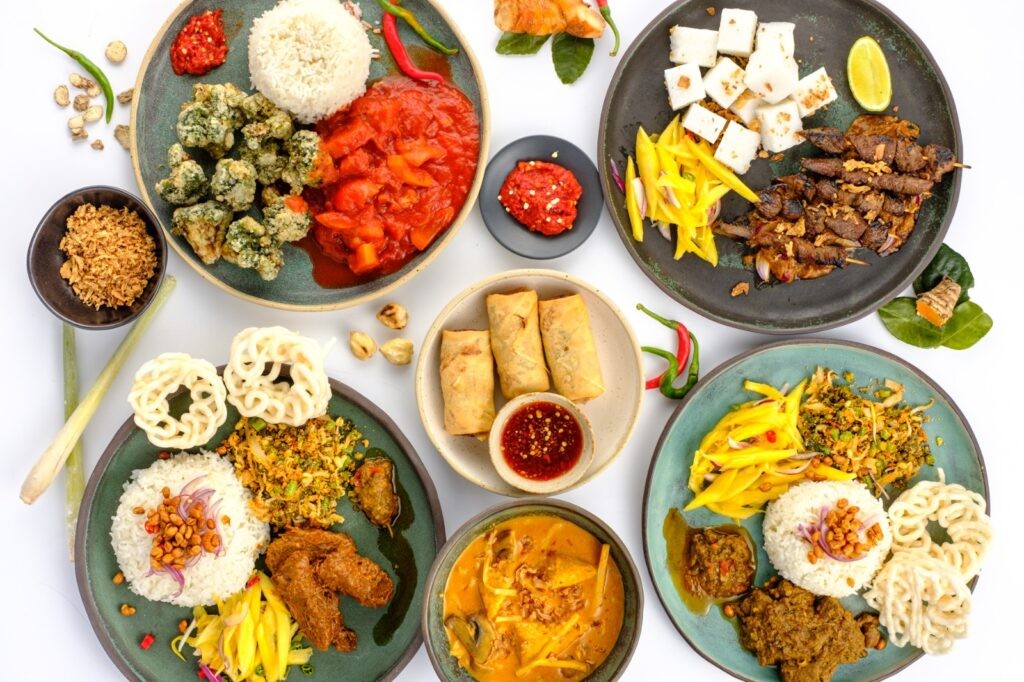
As you explore Indonesia, each region will have their specialty dishes and specific cuisine types. I could write an entire article on Indonesian food but to get you started, Indonesian staples that will be available everywhere are Nasi Goreng (fried rice) and Mie Goreng (fried noodles). My personal favourites were Beef Rendang, Soto Ayam, and Gado-Gado. You can also never go wrong with Ayam Bakar (Indonesian Grilled Chicken) with a side of sambal (chili sauce). Yum – now I’m getting hungry!
Something we tried to do is find out what the region’s “signature dish” was and try it while we were there. Hot tip – we learned that when you’re travelling outside of Jakarta, it’s very helpful to hire a driver and guide – they can take you to the local “hidden gems”.
What about driving in Jakarta?
Most expat corporate packages include a company vehicle and a driver. In our case, we had two drivers, plus constant access to Bluebird taxis or GoCar/Gojek rides, and so never needed to drive ourselves. This doesn’t mean you can’t be brave and get behind the wheel though! Many friends had an Indonesian driver’s license and drove themselves, mostly short distances on weekends. For foreigners to get a license, usually a valid KITAS/KITAP visa and a copy of your home country driving license or international driving permit is all that’s required. To get an idea of Jakarta driving conditions (and why I never attempted to drive myself!), check out this ‘First Impressions of Jakarta’ blog article where the dramatic Jakarta traffic is described in detail.
Cycling is the closest to driving I ever tried in Jakarta in group cycling tours led by OTHER SIDE Experiences through areas like Pondok Indah, Kemang and other popular spots. I highly recommend you check them out for yourself – contact details are listed following this article.

Jakarta “Must-dos”: City & Countryside
When we had guests who visited us in Jakarta, we were always trying to think of interesting places to show them, before we flew off on the obligatory Bali trip. (Expats in Jakarta will understand what I mean!)
My biggest recommendation within Jakarta is to take a walking tour called “The Other Side of Jakarta Tour”. Starting in Sunda Kelapa and finishing in Old Batavia, the tour gives you a glimpse into parts of Jakarta that tourists rarely see, brimming with history and a snapshot of how some locals live.
The fabulous tour guide Bram meets you in Sunda Kelapa, the oldest harbour in Jakarta, where you take a water taxi to see the cargo boats being loaded up with rice or cement bound for Borneo. If the water levels are right, you even get to board a ship to take a tour of the working and living quarters on these functioning ships. The water taxi drops you off at a fishing village, one of the oldest urban kampung (villages), where Bram expertly leads you through the narrow streets and introduces you to the locals. He knows everyone and is very passionate about showcasing the village to visitors.
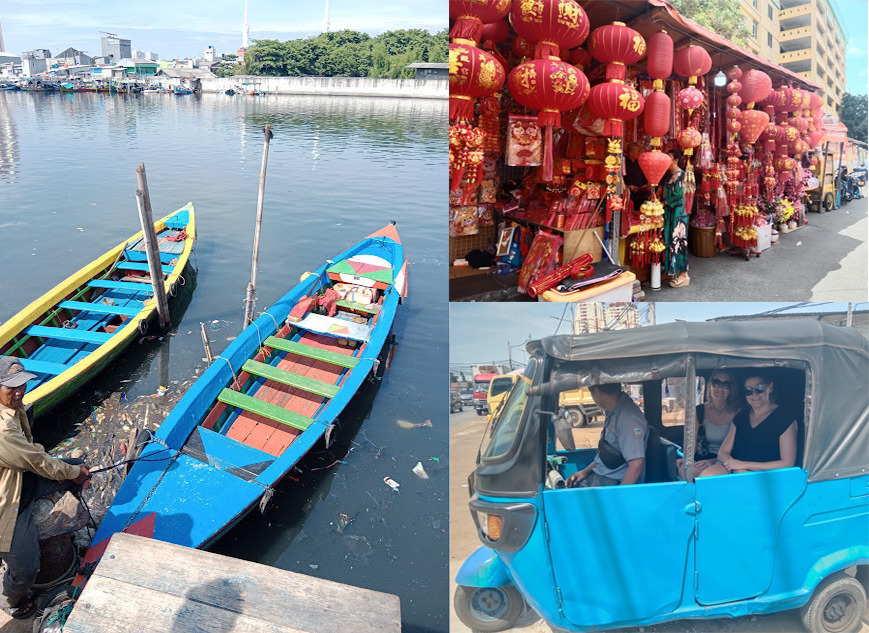
Next you visit the Maritime Museum, located in 17th century spice warehouses and the surrounding area that includes an old Dutch watchtower. To continue on the journey, you get to experience travel by bajaj (tuktuk). There’s a stop at the oldest bridge in Jakarta, the hanging “Chicken Market” bridge, then on to Chinatown (Glodok) to visit a Chinese temple and wet market. Finally, jumping aboard a local mini-bus – tricky for my fellow tall people – you exit at Kota Tua, the old Jakarta neighbourhood featuring 17th century Dutch buildings. I always ended our morning with lunch at Cafe Batavia, an elegant, colonial-era restaurant that features delicious Indonesian-style cuisine.
Bram is an amazing guide with excellent English. He is very knowledgeable and each time I took this tour (4 times!), I learned something new about Jakarta’s history or present day reality. My guests were always very surprised by how different each location was, especially when compared to the SCBD and Kemang. I’ve shared his contact details at the end of the article!
Our second “go-to” was to take guests out of the city for a hike in Sentul. Depending on who was visiting, we would go on a gentle or slightly rigorous hike through rice paddies, kampungs (villages), and usually end at a curug (waterfall). The views are spectacular on a clear day but even when it’s not, you can still see the beauty of the countryside and get a taste of a more traditional Indonesian way of life.
If you’re not going with someone experienced with Sentul trails, I highly recommend getting a guide. They’ll be able to help if it rains (which is 70% of the time in Sentul!), choose a trail at your desired experience level, and have even carried one or both of our kids on occasion! I’ve included contact details for idGuide, a popular Sentul guide group, at the end of the article. You can also ask around – this is a very popular question on expat WhatsApp chat groups and almost everyone will have a guide they love.
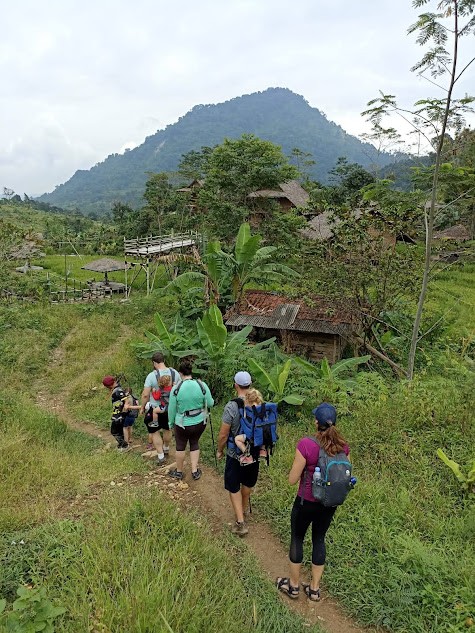
Culture Notes:
If you follow EMC’s instagram page (and you should!), you would have seen this post about cultural do’s & don’ts, or this post highlighting the top 3 culture shocks for expats. There’s also a whole blog article that explains the nuances of an Indonesian smile. I won’t rehash the contents of these posts but as someone who’s lived in Jakarta, trust me, some of these concepts can be difficult for many westerners to understand. I found simply being aware of these subtleties helped keep frustration levels down; after a while, my husband and I would simply shrug and put it in our “that’s Indonesia” box, and move on.
There were a couple of things I want to mention that took me by surprise and may not be widely known.
Fact – you will not hear the word “no” very often, especially from household staff or other workers. Indonesians don’t like to create a scene and hate disappointing someone or letting them “lose face”. So instead of “no”, you might get a “yes” that is followed by a very vague explanation that at its core, means no. Or you might get a “yes” but then over the next hours/days and the thing doesn’t happen, there will be vague explanations or smiles. This can be frustrating for those used to more direct communication styles but it’s important to remember it’s not “wrong”, it’s just different!
Speaking of things being different, cheesecake in Indonesia is not what you’d expect. A friend and fellow Canadian learned this one the hard way when she purchased a cheesecake for her son’s birthday from a local bakery. It arrived, looking absolutely gorgeous, but when they looked closer and cut it, they realized it wasn’t the cream cheese-based treat they were expecting. It was a layered white sponge cake, separated with buttercream frosting and … grated cheese!

Called ‘Kue bolu keju’, this is a traditional Indonesian cheese cake and although the combination of cake and icing with salty cheddar cheese is a blend that personally didn’t work for me, it is a well-loved dessert in Jakarta.
Have you seen the giant signs? If you’re already in Jakarta you know what I mean – large flower-covered signs will suddenly appear in front of stores, in malls, on sidewalks, and in front of homes. These Flower Boards are made of styrofoam and used by Indonesians, both individuals and businesses, to publicly announce congratulations for a new business launch, weddings, birthdays, and even condolences when someone passes. We were gifted one by our friends when we left Jakarta – unfortunately it didn’t fit in our suitcases!
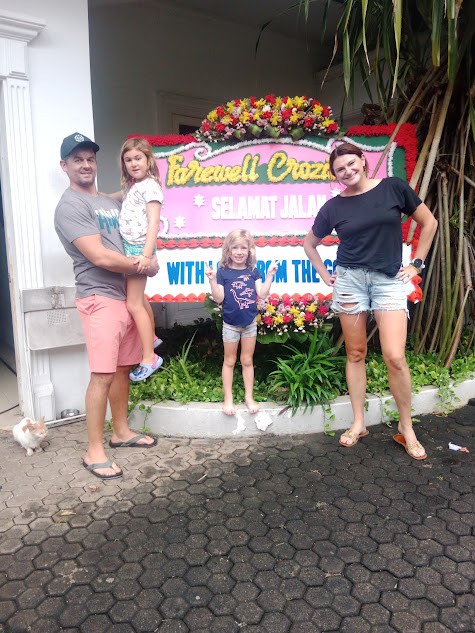
Don’t fret!
This may all seem a little overwhelming – I’ve skimmed over and briefly touched on a lot of really important subjects in these two blog articles. This is exactly why EMC offers services like ‘Settling in Services’, ‘Cross Cultural Training’, ‘Orientation Programmes’, and even has an open ‘Ask EMC’ question forum on the website. EMC has your back and can break it all down for you into smaller steps!
Final notes
The most important takeaway, which I hope you can see from my experience, is that Jakarta is an amazing city with so much to offer! Once you get the important details ironed out – healthcare, home, & school – you’ll have the time to explore and uncover your own version of Jakarta! Good luck on your own journey!
If you’re interested in hearing more about our experience as expats, Esti and I got together virtually to chat about it for the EMC podcast.
If you’re already living in Jakarta and have your own tips to share, comment below!
Contacts Mentioned:
Bram – The Other Side of Jakarta Tour
WhatsApp: +6281908088033
Instagram: @bramguide1990
idGuides – Sentul Hikes
WhatsApp: +6281218008401
Instagram:
OTHER SIDE Experience – Cycling tours
WhatsApp: +628111775893
Instagram: @othersideexperience

